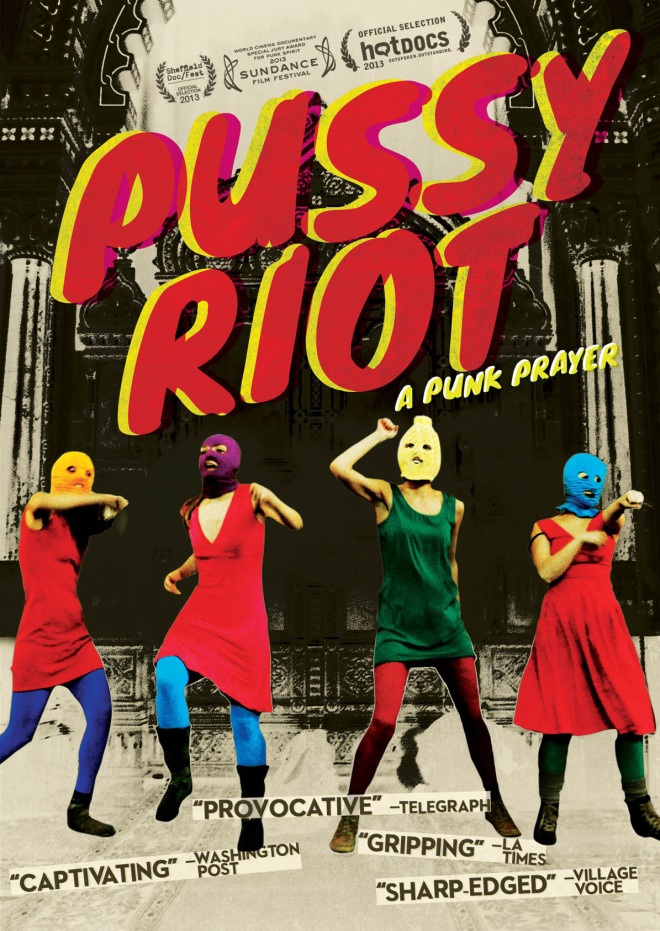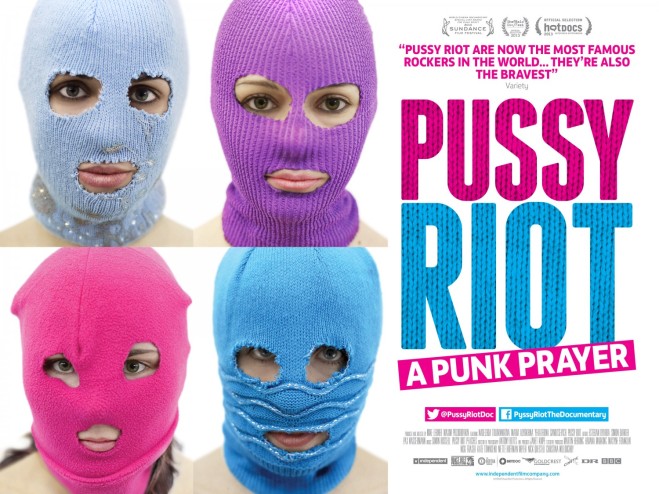
PUSSY RIOT: A PUNK PRAYER
Directed by Mike Lerner and Maxim Pozdorovkin
(2013, 1h 28 min)
Assista o filme completo:
http://youtu.be/iEF440_k-Og
"Art is not a mirror to reflect the world,
but a hammer with which to shape it."
BERTOLT BRECHT
Provocativo, excitante, instigante, indignante, hilário... esses são alguns dos adjetivos que acodem à mente para descrever este documentário sobre o Pussy Riot. Veja cenas explícitas e sem-censura das performances do grupo - incluindo "Orgia No Museu" e "Occupy Praça Vermelha". E saiba mais sobre o contexto do aprisionamento das garotas, que foram condenadas a 2 anos de prisão por terem entrado em uma catedral de Moscow e berrado um punk-rock desafinado contra o "ditador Vladimir Putin".
As garotas do Pussy Riot transformaram a performance artística, o teatro improvisado e a provocação punk em um espetáculo-freak que sacudiu a Rússia inteira e inflamou o debate sobre liberdade de expressão, fanatismo religioso, perseguição política contra dissidentes. O caso ecoou mundo afora, e até figuras como Yoko Ono e Madonna saíram em defesa do "Levante da Buceta".
Segundo o diretor Maxim Pozdorovkin, todo o bafafá e polêmica causados pelas riot grrrrls do Pussy Riot equivale ao fuzuê que ocorreu na Inglaterra, circa-1977, com a explosão dos Sex Pistols, cuspindo na cara da Rainha, da EMI e do caralho-a-quatro. As cenas do julgamento do Pussy Riot indicam claramente que o processo criminal contra as garotas tem a ver com outra causa além da liberdade de expressão e o direito do artista de se manifestar sua discórdia com o status quo: o que está em questão também é o Estado Laico, ou melhor, sua ausência na Rússia de Putin, onde o Estado e a Igreja Ortodoxa agem em estreitas e íntimas ligações.
O Pussy Riot só foi em cana por causa da "blasfêmia" que foi entrar numa Catedral e botar a boca no trombone contra o governo Putinesco e suas frequentes violações da laicidade do estado (que era um dos ideais da Revolução bolchevique de outubro de 1917). Enfim... vale a pena embarcar neste filmaço que relata como o punk rock feminista e a arte de protesto sacudiram a Rússia e desnudaram a faceta autoritária e repressiva da era Putinesca (com suas leis homofóbicas e suas gulags na Sibéria para artistas blasfemos...).
* * * * *
NOW magazine (Toronto):
"Note to authoritarian regimes: don’t think you can mount a show trial if the defendants are more media-savvy than you are. This and about a dozen other ideas – including the value of performance art and the power of Putin – are behind this kick-ass doc about Russian punk art collective Pussy Riot and the trial that ensued after the group put on a guerrilla performance – playing an anti-Putin anthem – in Moscow’s central cathedral. Charismatic arrestees Masha (Maria Alyokhina), Katia (Yekaterina Samutsevich) and especially Nadia (Nadezhda Tolokonnikova) and coverage of the trial and demonstrations both for and against Pussy Riot give this pic electrifying energy. See it."
* * * * *
Hail Pussy Riot. But, says doc director, learn some basic history first.
By SUSAN G. COLE
By SUSAN G. COLE
* * * * *
Ah, Pussy Riot! Instinctively, we love them – especially given their home country’s human rights record – but many of our assumptions about the brazen Russian art activists are false.
The case of the female threesome who became a worldwide cause célèbre when they were charged with hooliganism and jailed after their anti-Putin performance in a church is badly misunderstood.
So claims Maxim Pozdorovkin, co-director of Pussy Riot: A Punk Prayer.
For starters, Pussy Riot isn’t a punk band. The arrested women are members – though their standing among their comrades is in question now that they’ve blown up worldwide – of a loose collective of artists, filmmakers and journalists working to create a different iconography for protest.
“They see themselves as contemporary artists determined to bring theatre into life,” says the hyper-articulate director on the phone from New York City. He’s there on the eve of an Amnesty International benefit, where recently released activists Maria Alyokhina and Nadezhda Tolokonnikova are set to appear – introduced by Madonna. He’s hanging out with them and planning to make a short film of the event.
“I always said that the story was misrepresented in Russia and in the West – I’m not sure where it was worse,” Pozdorovkin declares.
In Russia, they’re wrongly accused of being anti-religion, he claims.
“And in the West, it’s assumed that because they were a punk band singing an anti-Putin song, they went to jail. That’s nonsense. If they’d sung the song outside of the church, or anywhere else, no one would have cared.
“They had done so many things before that you’d think would’ve landed them in jail. In the U.S., for example, you couldn’t do the orgy in the National History Museum [explicitly shown in the film] and not go to jail.”
Pozdorovkin, who grew up in Moscow, played in punk bands and has a PhD from Harvard in found-footage filmmaking, is almost apoplectic at the idea that Putin’s regime can be compared to even the lighter anti-gay side of Stalinism. He sees more chaos than control in the new Russia.
“One of the biggest mistakes Westerners make is seeing the oppressive aspects of the arrest and trial as somehow organized and coming from the top down. That’s simply not the case.”
It was the women themselves – not the Russian authorities – who requested in a motion that the trial be filmed. The motion was granted, resulting in some of the doc’s most mesmerizing footage. A Russian news agency did the shooting, and Pozdorovkin, blown away by the quality of the initial rushes, then set the project in motion.
Though he allows that Pussy Riot are incredibly media-savvy, he says they weren’t totally aware of what they were getting into by making their statement inside a church.
“They didn’t mean to offend people. They felt they had the right to do what they did, and that maybe they’d be fined for, say, trespassing, but not be criminally charged. There’s something about the story that’s anachronistic, beautiful, idealistic.”
But the radical troupe is changing the way people look at performance and politics, which was precisely Pussy Riot’s intention. Soviet culture had never before been confronted by punk ideals and conceptual art on a mass level.
“The public awareness that you got with [the Sex Pistols’] God Save The Queen, that never happened in Russia until Pussy Riot.”








Nenhum comentário:
Postar um comentário